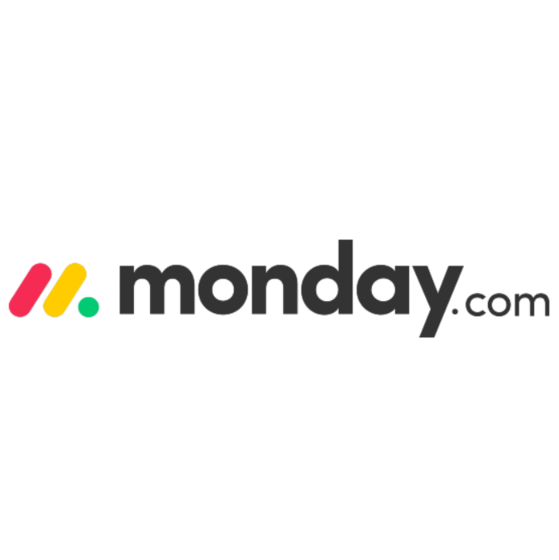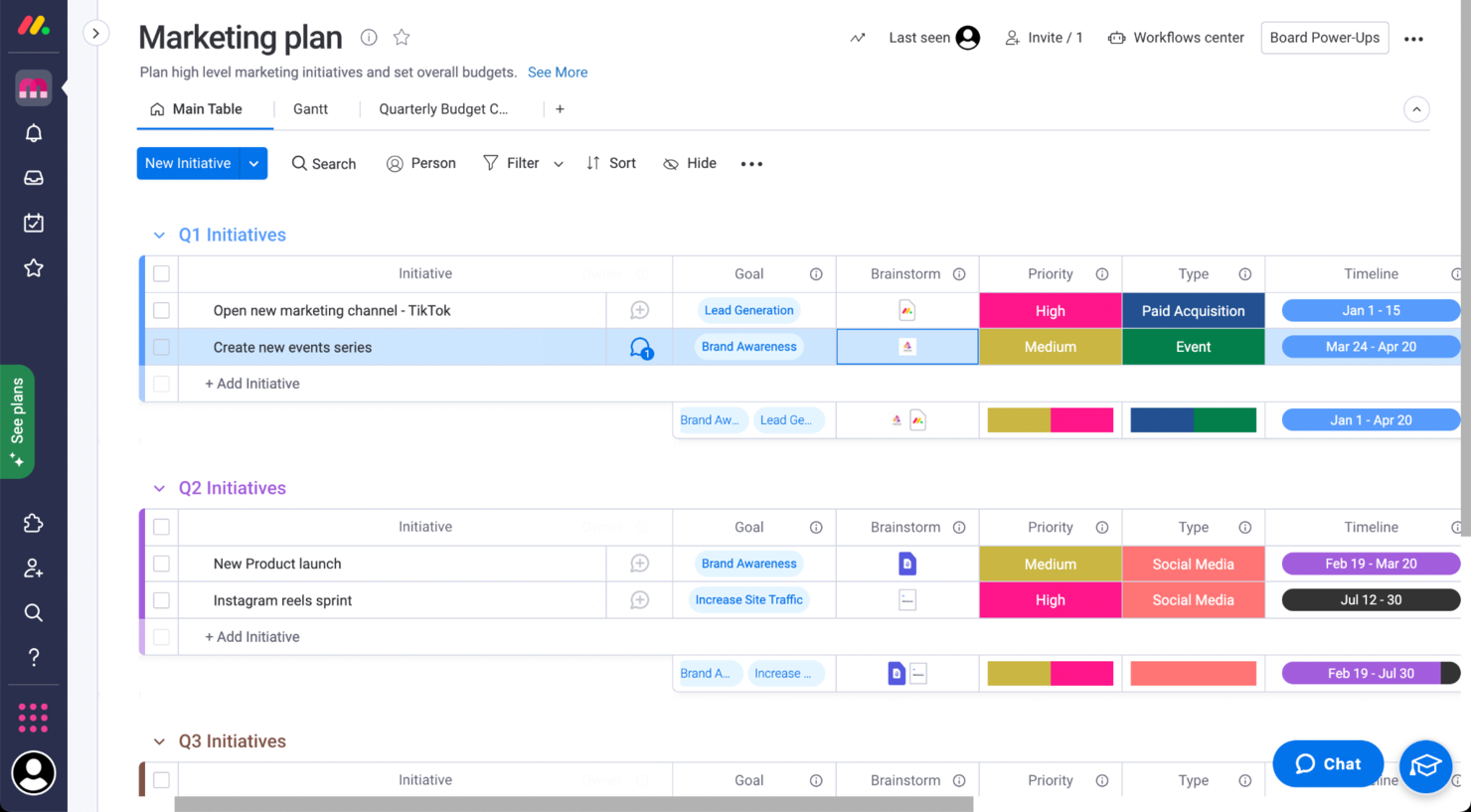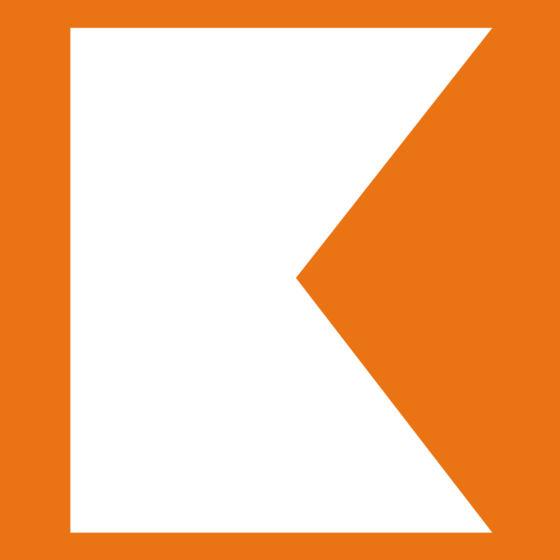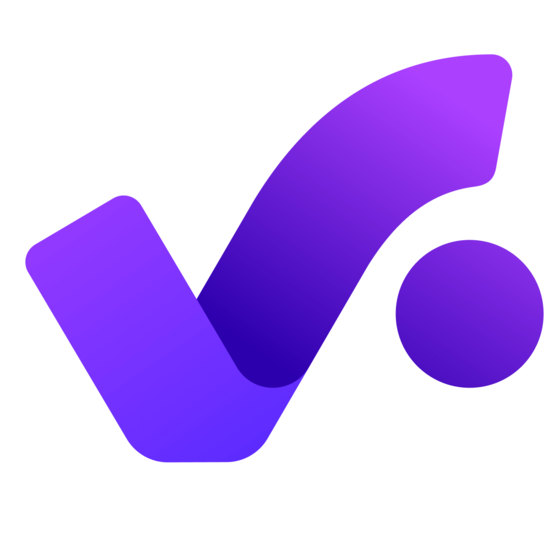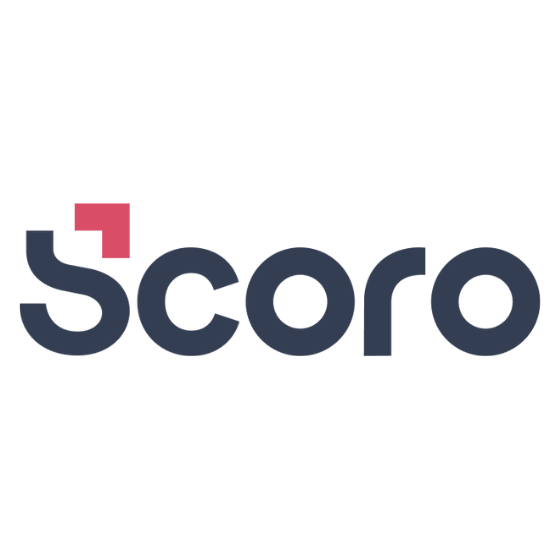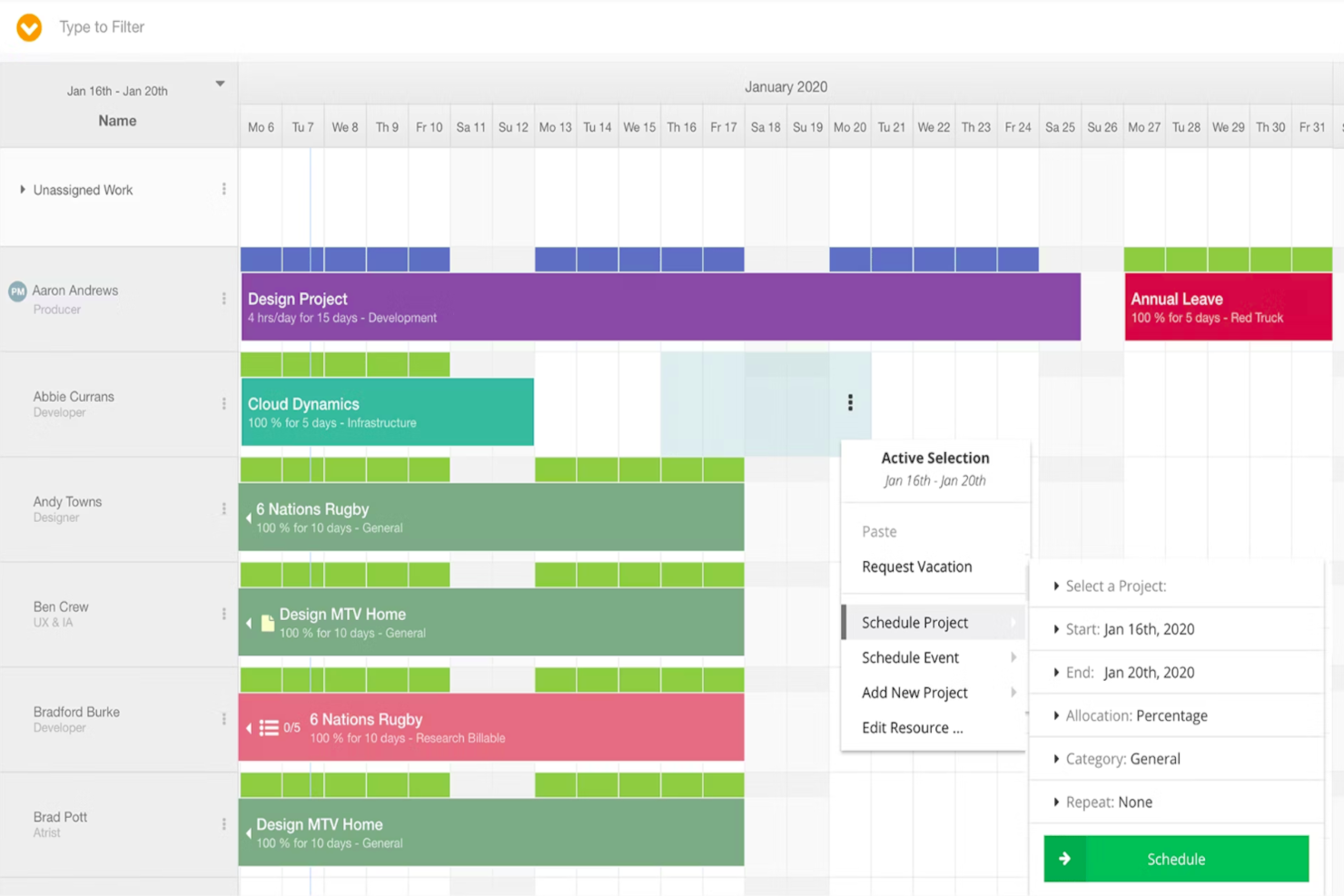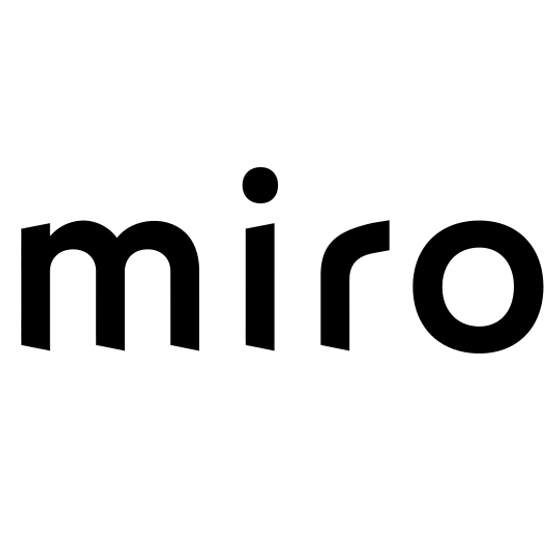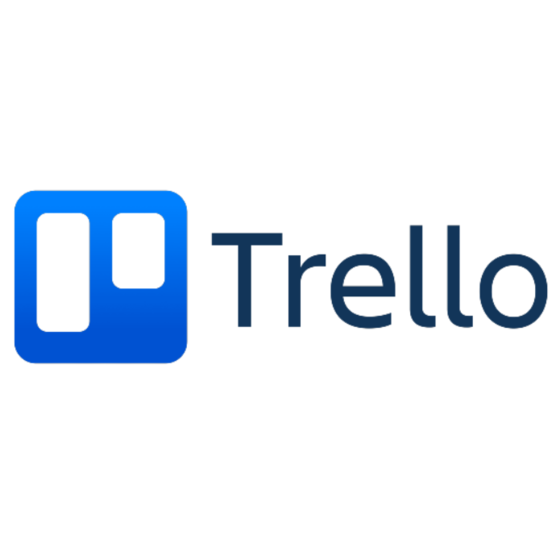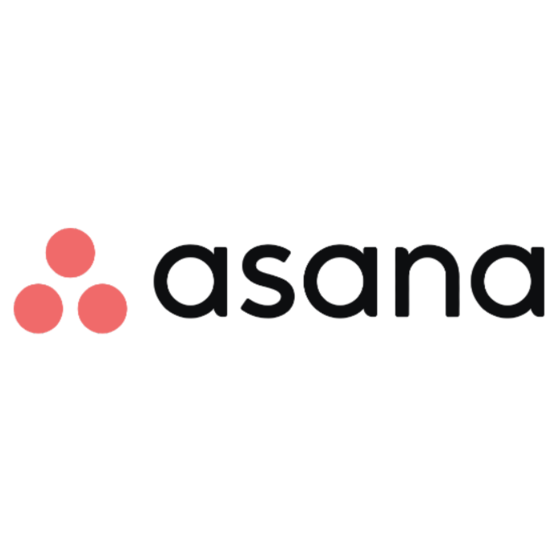10 Best Digital Marketing Project Management Software Shortlist
Here's my pick of the 10 best software from the 20 tools reviewed.
With so many different marketing PM solutions available, figuring out which is right for you can be tricky. You know you want to streamline workflows, plan and execute campaigns effectively, manage content creation, and analyze campaign performance, all within a centralized digital environment but need to figure out which tool is best. I've got you! In this post I'll help make your choice easy, using my personal experiences overseeing dozens of different digital marketing projects to select my picks of the best digital marketing project management software.
Why Trust Our Digital Marketing Project Management Software Reviews
We’ve been testing and reviewing project management software since 2012. As project managers ourselves, we know how critical and difficult it is to make the right decision when selecting software.
We invest in deep research to help our audience make better software purchasing decisions. We’ve tested more than 2,000 tools for different project management use cases and written over 1,000 comprehensive software reviews. Learn how we stay transparent & our review methodology.
The Best Digital Marketing Project Management Software Comparison Chart
Here is a table you can use to compare the tools we just covered in the overviews.
| Tools | Price | |
|---|---|---|
| monday.com | From $8/user/month (billed annually, min 3 seats) | Website |
| Kantata | From $19/user/month (billed annually) | Website |
| Productive | From $11/user/month | Website |
| Scoro | From $26/user/month (billed annually) | Website |
| Hub Planner | From $7/user/month (billed annually) | Website |
| Plaky | From $3.99/user/month (billed annually) | Website |
| Miro | From $10/user/month | Website |
| Trello | From $6/user/month | Website |
| Asana | From $13.49/user/month | Website |
| ActiveCollab | Starts from $11/month for up to 3 users | Website |
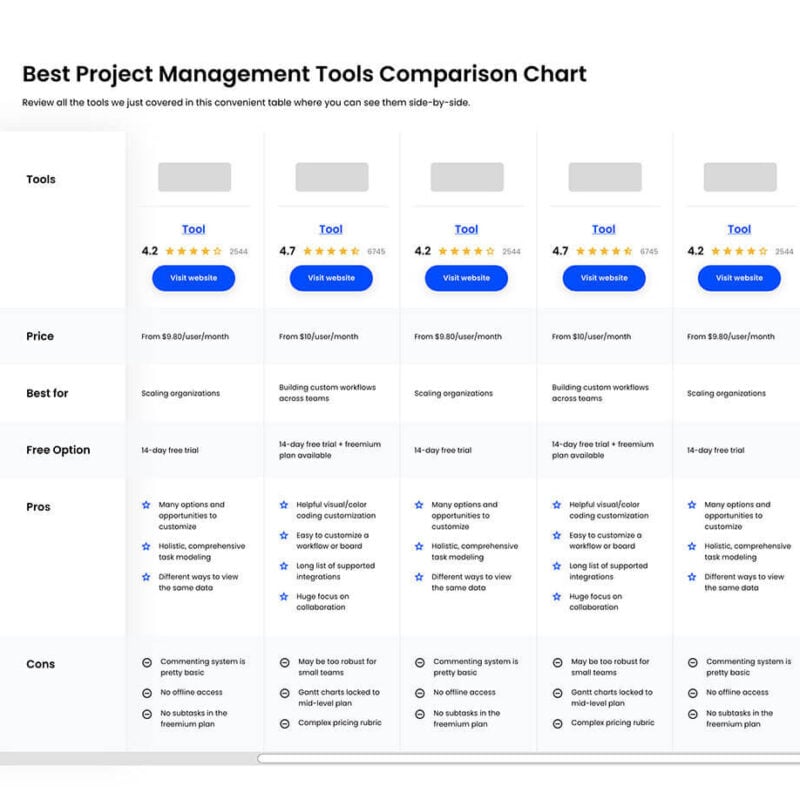
Compare Software Specs Side by Side
Use our comparison chart to review and evaluate software specs side-by-side.
Compare SoftwareHow To Choose Digital Marketing Project Management Software
With so many different digital marketing project management solutions available, it can be challenging to make decisions on what digital marketing project management software is going to be the best fit for your needs.
As you're shortlisting, trialing, and selecting digital marketing project management software, consider the following:
- What problem are you trying to solve - Start by identifying the digital marketing project management feature gap you're trying to fill to clarify the features and functionality the digital marketing project management software needs to provide.
- Who will need to use it - To evaluate cost and requirements, consider who'll be using the software and how many licenses you'll need. You'll need to evaluate if it'll just be the project management professionals, or the whole organization that will require access. When that's clear, it's worth considering if you're prioritizing ease of use for all, or speed for your digital marketing project management software power users.
- What other tools it needs to work with - Clarify what tools you're replacing, what tools are staying, and the tools you'll need to integrate with, such as accounting, CRM or HR software. You'll need to decide if the tools will need to integrate together, or alternatively, if you can replace multiple tools with one consolidated digital marketing project management tool.
- What outcomes are important - Consider the result that the software needs to deliver to be considered a success. Consider what capability you want to gain, or what you want to improve, and how you will be measuring success. For example, an outcome could be the ability to get greater visibility into performance. You could compare digital marketing project management features until you’re blue in the face but if you aren’t thinking about the outcomes you want to drive, you could be wasting a lot of valuable time.
- How it would work within your organization - Consider the software selection alongside your workflows and delivery methodology. Evaluate what's working well, and the areas that are causing issues that need to be addressed. Remember every business is different — don’t assume that because a tool is popular that it'll work in your organization.
Best Digital Marketing Project Management Software Reviews
Here’s a brief description of each marketing project management tool to showcase my research, experience with the tool, and a screenshot of its user interface.
Access a file repository for your project as a view within your board.
monday marketer is a product from monday.com specifically designed for marketing teams. If you are already familiar with monday.com, it will be easy to transition to this product. Among the noteworthy features are the colorful, customizable tables, the focused conversations on each task, and its proofing capabilities for uploaded files.
Get ready for some quick firing… Add ‘files gallery’ as a view to see a repository widget with all the uploaded files on a board. Click on an uploaded file to open the proofing feature where you can communicate via chat, access version control, and annotate specific sections of the design. Finally, access the workflow center to automate notifications and keep your content moving.
Note: For this last point, click on your profile and select ‘workflows’ from the menu.
monday.com integrates with Figma Designs, Ziflow, Google Sheets, and the entire Google Suite, Slack, and thousands of other apps. It even has an Adobe Creative Suite plugin for your team to work on monday.com without leaving their design software.
Monday Marketer has a free plan for up to 2 users. Paid plans start at $10/user/month and offer a 14-day free trial.
Kantata
Best for streamlining digital projects while remaining budget-conscious
Kantata is a versatile tool that can assist in digital marketing project management by offering features such as task management, collaboration tools, and project tracking to help teams effectively manage their digital marketing campaigns. Kantata aims to improve project efficiency by providing a centralized platform for planning, executing, and monitoring marketing initiatives. It allows teams to assign tasks, set deadlines, and track progress, ensuring that projects are completed on time and within budget.
Kantata's centralized platform help teams stay aware of a project's budget, scope, and timeline. With such information readily available, teams can then create better forecasts for time and resource management. Additionally, Kantata offers in-the-moment financial insights that allow for more accurate, budget-conscious planning. Time, expense, and cost tracking also allows teams to manage resources in real time.
Kantata integrates with Slack, Sage, Quickbooks, Expensify, BambooHR, NetSuite, Jira, Salesforce, Xero, and Google Workspace.
Kantata offers pricing information and a free demo upon request.
Productive is a project management software and Professional Services Automation (PSA) tool that caters to the needs of agencies and professional services by providing a centralized platform for managing projects, tracking time, and overseeing resources. The software is designed to assist agencies throughout the entire project lifecycle, from planning to execution.
Productive's project management features, including a Gantt chart maker, facilitate project setting up, tracking, and delivery, while the time tracking feature ensures accurate billing and productivity analysis. Sales tools help manage the sales pipeline and client relationships, and the billing feature streamlines the creation and sending of invoices. Document creation and management are also supported within the platform.
Productive additionally provides tools for flexible budgeting and data-driven resource planning, which aids in the allocation of team members based on availability and skill sets. Moreover, Productive's emphasis on reporting provides insights into team utilization, project performance, and financial health and helps agencies focus on profitability.
Productive integrates with Factorial, Justworks, Personio, Slack, Google Calendar, Jira, HubSpot, BambooHR, Fortnox, and ADP Workforce Now.
Productive costs from $11/user/month and provides a 14-day free trial.
Scoro is a comprehensive work management software designed for professional services. It offers a wide range of features to manage processes and improve productivity. The platform is ideal for end-to-end work management because it provides visibility and control over every part of a project. This unified approach makes Scoro adaptable to a wide range of industries, including digital marketing.
Its ability to deliver projects from quote to cash, manage customer accounts, track sales pipelines, and provide detailed time tracking makes it a robust solution for managing complex digital marketing projects. The platform has features like sales and CRM management, resource planning, utilization, invoicing, cost management, and collaboration. These features give marketing agencies real-time visibility and control over their operations, enabling them to track profitability, balance workloads, and enhance teamwork.
Scoro integrates with Google Calendar, iCal Calendar, MS Exchange, QuickBooks, Xero Accounting, Expensify, Stripe, Dropbox, FTP, Google Drive, Slack, and Zapier. It also provides an API for custom integrations.
Scoro pricing starts from $26/user/month (billed annually). A free trial is also available.
Hub Planner software is a project and resource management software that's well-suited to the needs of digital marketing teams and agencies. It includes employee scheduling, time tracking, and project management features. By combining project and resource management into a single tool, it helps you ensure work is well-planned and effectively executed.
You can allocate team members to specific projects and tasks based on their skill sets and capacity, which is useful for effectively delegating work on multi-expertise teams. The platform's drag-and-drop interface makes scheduling easy and gives you a clear overview of who's working on what, when. Employees can track their time in the platform, too, which allows for capacity planning and resource forecasting.
Project financials can also be tracked and managed in the software. You can quickly see real-time project costs, helping you track expenses as they progress and avoid overspending. Resource utilization, individual projects, and budgets can also be monitored using the customizable reports.
You can integrate the platform with other tools either via the API or with a paid Zapier account.
Pricing starts at $7 per user per month when billed annually, and a 30-day free trial is available.
Plaky is a project management software that helps teams from various industries, including digital marketing, visualize their tasks and stay on top of project deadlines. Its free plan offers unlimited users and projects, making the platform widely accessible for teams of all sizes.
Plaky offers different ready-to-use project management templates tailored to common digital marketing use cases, like strategy planning, content calendars, design requests, event planning, and social media planning. These are fully customizable to meet the specific needs of your team. Alternatively, you can also build a board from scratch and save it as a template for others in your organization to use at a later time.
You can view projects in various formats, like lists, Kanban boards, and Gantt charts, and keep track of project progress through status updates and the live activity log. Plaky also facilitates collaboration among teams by allowing commenting directly on tasks for full visibility.
Integrations include Clockify for time tracking and Pumble for real-time communication.
Plaky is free to use for unlimited users and projects. Paid plans with more advanced features start at $3.99/user/month (billed annually).
Miro is a visual collaboration and innovation platform designed to support a wide array of activities including process mapping, retrospectives, mind mapping, and product planning. It is recognized for its ability to facilitate collaboration among over 60 million users, earning high ratings for its effectiveness in enabling teams to work together efficiently and improve the speed and quality of their work.
I chose Miro for the digital marketing project management software because it provides a comprehensive workspace that supports easy formatting and integration with other tools, which is essential for managing complex marketing projects. What makes Miro stand out is its user-friendly interface that facilitates real-time collaboration and efficient project tracking, accommodating projects of any scale.
Integrations include Zoom, Figma, Asana, Microsoft Teams, Jira, Slack, Google Drive, Box, Airtable, Notion, Azure, and Webex. Some integrations are limited to paid plans only.
Miro is free to use for unlimited members with up to 3 editable boards. Paid plans start at $10/user/month (billed annually).
Trello
Receive automation suggestions based on usage patterns to optimize your workflow.
Trello is known for its kanban boards and how they help teams align around project management. Digital marketing teams can benefit from this platform and handle their editorial calendar, email workflows, and go-to-market campaigns.
Starting is easy. You can do it from scratch or select one of the multiple marketing templates available. Although not native to the platform, you can manage your attached files through a power-up. That will let you see a repository of all your assets in one place.
Something I like about Trello is its automations. The platform will analyze patterns of usage over time and give you suggestions on what you should automate to save time.
Trello integrates with more than 200+ apps and tools your team depends on, like Slack, Google Drive, Salesforce, Dropbox, and more, directly into your Trello boards. (Note: Some connections require an additional subscription fee.)
Trello has a free plan, and paid ones start at $5/user/month with a 14-day trial.
Asana
Automations, asset management, and content proofing in one good-looking product.
Asana is a work management platform that has the features available to help you with your marketing projects. After going through other tools on this list, it was clear to me that not all of them offer every feature on a digital marketing professional’s wishlist. However, there’s always an exception!
Let’s review our criteria. Automations (check), proofing (check), asset management (check). You can access the file manager from the ‘more’ menu option. Click on any file, and you can start proofing them. Finally, whenever you set rules for automations, Asana adds a lightning icon to let you know the sections of your project that have this feature active.
Asana integrates with Microsoft Teams, Adobe Creative Cloud, JIRA Cloud, Salesforce, Tableau, Slack, Clockwise, MS Office 365, Google Calendar, Gmail, GitLab, and a growing list of other apps. Plus, a plan with Zapier or Tray.io can let you access other apps to connect with Asana.
Asana is free for up to 15 users. Paid plans start at $10.99/user/month and offer a 30-day free trial.
ActiveCollab
Create invoices for your clients in minutes, thanks to its financial capabilities.
Starting as an open source project, ActiveCollab has been in the market for over a decade. It is a marketing project management software that features time, resource, and task management. Additionally, it allows you to invite unlimited external clients to collaborate with your team.
ActiveCollab lacks collaboration in the content creation process, like proofing and approval workflows. However, it has what you need to import files from Google Drive or other storage solutions. It can also grab information from timesheets and generate invoices for your clients in minutes. Consider this platform if you are not big on co-creating assets.
ActiveCollab integrates with Slack, Google Drive, Dropbox, and thousands of other apps through a Zapier connector.
ActiveCollab is free for personal use. Paid plans start at $7.50/user/month and offer a 14-day free trial.
Get the PM Software Buyer's Guide
Other Digital Marketing Project Management Software
Here are a few more that didn’t make the top list but are still worth your consideration.
- Workamajig Platinum
Build guides and pre-made content from start to finish.
- Ravetree
Manage your projects, resources, clients, and finances in one place
- Workzone
Manage your files and view their various versions in one view.
- Height App
Best for custom user views and in-app team collaboration
- Gain
Automated workflows for approval rounds with multiple approvers.
- TeamGantt
Older versions of a file are kept in a separate view, so you can keep track of changes.
- ClickUp
Create custom forms to gather requirements from your team or clients.
- Smartsheet
Best for digital marketing teams at enterprise organizations
- Wrike
Give the approver the option to comment or have the final say without leaving the proofing window.
- Screendragon
Brings clarity to the design team through its side-by-side version comparison feature.
Related Digital Marketing Project Management Software Reviews
If you still haven't found what you're looking for here, check out these other related tools that we've tested and evaluated:
- Project Management Software
- Resource Management Software
- Task Management Software
- Project Tracking Software
- Project Scheduling Software
Selection Criteria For Digital Marketing Project Management Software
Selecting the right digital marketing project management platform must involve a detailed evaluation of each tool's functionality and capacity to meet specific use cases crucial to your business operations. Having personally tested and researched various tools, I've developed a criteria framework to help pinpoint high-quality software. Each criterion relates to a core function of standout software and is weighted to reflect its importance to my overall evaluation.
Core Digital Marketing Project Management Software Functionality (25% of total weighting score): To be considered for inclusion on my list of the best digital marketing project management platforms, the solution had to support the ability to fulfill common use cases:
- Task assignment and progress tracking to ensure accountability and visibility.
- Centralized communication tools for team collaboration and clarity.
- Campaign analytics for measuring performance and making data-driven decisions.
- Resource allocation to optimize team workload and project delivery timelines.
- Document storage and sharing for easy access to marketing assets and collateral.
Additional Standout Features (25% of total weighting score): Beyond the basics, standout features can set a software apart from its competitors. This evaluation looks for innovative and unique functionalities that offer digital marketers additional value, enhancing their ability to execute and optimize campaigns. This can include:
- Predictive analytics for better forecasting of campaign performance.
- Integrated content management systems for streamlined content creation.
- Advanced AI-driven insights for optimizing marketing strategies.
- Unique integrative capabilities with new marketing platforms.
- Innovative collaborative features that enhance team synergy.
Usability (10% of total weighting score): Usability ensures that the software is accessible and efficient for all team members, regardless of their technical skill level. This criterion assesses the software’s design and interface, focusing on how it simplifies complex processes and enhances user experience. I look for:
- Intuitive navigation and minimal learning curve.
- Drag-and-drop functionalities in task and schedule management.
- Mobile optimization for team access anytime, anywhere.
Onboarding (10% of total weighting score): The onboarding process is critical for teams to quickly adopt and effectively use software. This evaluation considers the availability and quality of training resources, support, and tools that facilitate a smooth transition and immediate productivity boost, such as:
- Comprehensive training materials such as videos and interactive tours.
- Pre-built templates for rapid setup and deployment.
- Responsive support resources, including chatbots and community forums.
Customer Support (10% of total weighting score): Effective customer support is essential for resolving issues and ensuring continuous productivity. This criterion examines the availability, responsiveness, and helpfulness of the software’s support team, ensuring users can get the assistance they need when they need it. I assess:
- Multichannel support options for timely assistance.
- Extensive online resources for self-service troubleshooting.
- Quality and speed of support responses.
Value For Money (10% of total weighting score): Evaluating value for money involves comparing the software’s cost against the benefits and features it offers. This criterion looks for:
- Transparent and fair pricing models.
- Flexible plans suitable for various team sizes and budgets.
- Impact of software features on marketing efficiency.
Customer Reviews (10% of total weighting score): Customer reviews provide real-world insights into the software’s performance and user satisfaction. This evaluation sifts through user feedback to identify consistent strengths and weaknesses, offering a balanced view of the software’s effectiveness. This includes:
- Positive testimonials on ease of use and impact on marketing projects.
- Constructive critiques highlighting areas for improvement.
- Consistent praise for specific beneficial features.
Through this criteria framework, my aim is to offer a comprehensive analysis that guides users in selecting a digital marketing project management platform that not only addresses their immediate needs, but also supports their long-term marketing objectives.
Trends In Digital Marketing Project Management Software For 2024
Digital marketing project management software continues to evolve rapidly in 2024, driven by the need to streamline workflows, enhance collaboration, and improve the execution and monitoring of campaigns. Recent trends reflect ongoing efforts to address the complex challenges faced by digital marketing professionals, ensuring that the software they rely on is both powerful and user-friendly. Below, I have compiled a shortlist of trends that I believe will continue to impact digital marketing project management software in the future.
- Advanced Automation and Workflow Customization: There's a growing trend towards more sophisticated automation of routine tasks and the customization of workflows to fit unique project needs. These features are designed to save time and reduce manual errors, addressing the need for efficiency and precision in digital marketing projects.
- Greater Use of Predictive Analytics: Beyond basic analytics, predictive analytics are being woven into digital marketing project management tools, offering forecasts on campaign outcomes, consumer behavior, and market trends. This advanced feature supports strategic planning and risk management, allowing marketing teams to adjust strategies proactively rather than reactively.
- Demand for Comprehensive Analytics and Reporting: The need for advanced analytics and detailed reporting features is more pronounced than ever, as marketers seek to measure the effectiveness of their campaigns in real-time and adjust strategies accordingly. This demand highlights the importance of accountability and performance measurement in digital marketing.
- Expansion of Omnichannel Marketing Support: As brands strive to provide a seamless customer experience across all digital platforms, project management tools are expanding their support for omnichannel marketing. This includes features for managing and tracking campaigns across multiple channels from a single dashboard, reflecting the need for a holistic approach to digital marketing.
- Sustainability and Ethical Marketing Features: With a growing emphasis on sustainability and corporate responsibility, some project management tools are beginning to incorporate features that help plan and execute ethical marketing campaigns. This includes carbon footprint calculators for digital campaigns and tools for ensuring that marketing materials meet certain ethical standards, catering to the increasing demand for responsible business practices.
These trends indicate a broader shift towards more intelligent, comprehensive, and flexible digital marketing project management solutions. As software developers continue to innovate, digital marketers can expect tools that not only meet their current needs, but also anticipate future challenges and support the creation of more effective and ethically responsible marketing campaigns.
What Is Digital Marketing Project Management Software?
Digital marketing project management software is a specialized tool that provides a digital workspace where marketers can plan and coordinate campaigns, manage content creation and distribution, track performance metrics, and collaborate with team members. This software typically includes features such as content creation and scheduling, social media management, file sharing, proofing, analytics tracking, and collaboration tools.
This software is essential for coordinating complex campaigns and tracking key performance indicators (KPIs) to measure the success of marketing efforts – ensuring a smooth and organized execution of digital marketing initiatives.
Features of Digital Marketing Project Management Software
Digital marketing project management blends strategy, coordination, and technology to ensure that every aspect of a digital marketing campaign is executed efficiently. Consequently, certain project management features are essential to successfully navigating the complexities of digital marketing. Here, I outline ten key features to look out for when selecting digital marketing project management software.
- Task Automation: Automating routine tasks frees up time for team members to focus on more strategic and creative aspects of campaigns, ensuring efficient use of resources.
- Real-time Collaboration: This feature is critical for maintaining a unified vision among diverse teams and allows for instant feedback and adjustments, keeping projects agile and aligned with objectives.
- Integrated Analytics: By having analytics integrated within the project management tool, teams can easily measure and analyze the impact of their campaigns, making data-driven decisions to optimize future efforts.
- Customizable Dashboards: Customizable dashboards enable team members to monitor the metrics that matter most to them, ensuring quick access to relevant information and helping keep everyone on track.
- Resource Management: Effective resource management helps in identifying available resources and assigning them to tasks efficiently, preventing burnout and ensuring that projects are delivered on time.
- Time Tracking: Time tracking is essential for understanding the effort involved in various activities, allowing for better planning and billing accuracy.
- Scalable Project Templates: Having scalable templates allows teams to quickly initiate new projects based on proven frameworks, saving time and ensuring consistency across campaigns.
- Document Sharing and Storage: Easy access to documents and the ability to share them seamlessly within the project management tool, rather than trying to integrate with DAM software, is important for keeping everyone informed and ensuring that all team members are working from the latest versions of documents.
- Access Controls and Permissions: This feature protects sensitive information and ensures that team members only have access to the data and tasks relevant to their role, maintaining project security.
- Mobile Accessibility: In today’s fast-paced, and often remote, environment, the ability to access project information and communicate with team members via mobile devices ensures that projects keep moving forward, even when team members are away from their desks.
Utilizing a digital marketing project management tool that provides these features can significantly enhance the efficiency and effectiveness of your online campaigns. Not only will the right tool streamline the planning and execution process, but it should also provide the insights and flexibility needed to adjust strategies in real time, helping your digital marketing efforts to achieve their maximum potential.
Benefits of Digital Marketing Project Management Software
For businesses and marketing professionals looking to elevate their online presence, digital marketing project management tools offer a suite of features designed to streamline operations, enhance team collaboration, and drive campaign success. Here are five primary benefits these platforms provide that underscore why investing in digital marketing project management software is a strategic move for any business aiming to thrive online.
1. Enhanced Efficiency: By automating routine tasks and centralizing information, digital marketing project management software significantly reduces the time and effort required to manage campaigns, allowing teams to focus on strategy and execution.
2. Improved Collaboration: This software creates a shared space for team members to collaborate in real time, ensuring that everyone is aligned with the project goals and timelines, thereby enhancing teamwork and reducing misunderstandings.
3. Increased Accountability: With features that assign tasks and track progress, each team member knows their responsibilities, leading to increased accountability and a higher likelihood of project success.
4. Data-Driven Decision Making: The ability to integrate and analyze campaign data within the software enables businesses to make informed decisions, optimizing strategies for better results based on real-world data.
5. Scalability: Digital marketing project management software is designed to accommodate the evolving needs of a business, from managing a single campaign to multiple complex projects, ensuring the tool remains useful as the organization expands.
Investing in digital marketing project management software equips businesses with the tools necessary to navigate the complexities of online campaigns with ease. These tools can both enhance operational efficiency and collaboration and provide a foundation for making informed, data-driven decisions that drive growth.
Costs & Pricing for Digital Marketing Project Management Software
Navigating the pricing and plan options of digital marketing project management software can seem daunting, especially for those new to this type of tool. Typically, vendors offer a range of plans designed to meet the needs of different sizes and types of teams, from small in-house groups to large agencies.
Understanding these options is crucial to ensuring you select a solution that not only fits your budget, but also provides the features and capabilities necessary to streamline and optimize your digital marketing efforts.
Here, I've provided a simplified overview of common plan types, their average prices, and the features typically included.
Plan Comparison Table for Digital Marketing Project Management Software
| Plan Type | Average Price | Common Features |
|---|---|---|
| Free | $0 | Basic task management, limited users, essential integrations, basic analytics |
| Basic | $10-$20 per user/month | Enhanced task management, more users, additional integrations, improved analytics |
| Professional | $50-$100 per user/month | Advanced project management, unlimited users, full suite of integrations, advanced analytics, premium support |
| Enterprise | Custom Pricing | Customizable features, advanced security, dedicated support, training & onboarding services |
When considering which plan to choose, it is important to focus on the size of your team, the complexity of your projects, and the specific features you need to achieve your digital marketing goals. Starting with a free or basic plan can be a good way to test the waters, with the option to upgrade as your needs grow and evolve.
What Is Project Management In Digital Marketing?
Project management in digital marketing is usually the coordination of online marketing collateral for brands, whether that is a landing page for a brand, social media content, banners, or any paid media-related deliverables.
The job of the project manager usually involves communicating client needs to the creative teams, gathering feedback, getting approvals for collateral, and explaining changes to the client. Scope creep is also present in these projects as the client will always try to sneak in a few extra campaigns, designs, images, special favors, and what have you.
Read more about the different use cases of project management software here.
What's Next?
Although tracking task lists, to-do lists, milestones, and dependencies is most of what you’ll do, there are more things to think about. For example, how should your team tag content in the DAM software so you easily find it for your next pitch? How do you organize your marketing resources to be the most efficient?
If you are a DPM or interested in digital project management, I highly recommend you join our Insiders Newsletter. It’s free, you receive it in your inbox every week, and it’s got tons of value! (like learning why our constant search for dopamine forces us to seek quick wins when we should be prioritizing the hard, more impactful work).


